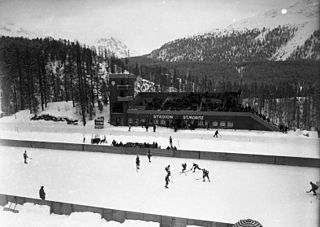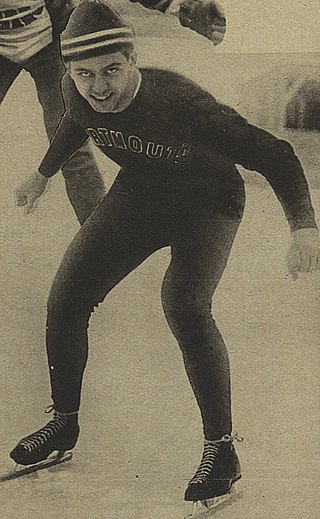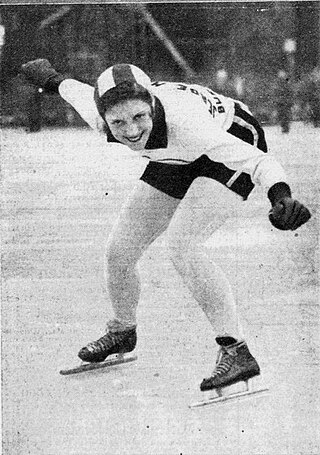
Speed skating is a competitive form of ice skating in which the competitors race each other in travelling a certain distance on skates. Types of speed skating are long-track speed skating, short-track speed skating, and marathon speed skating. In the Olympic Games, long-track speed skating is usually referred to as just "speed skating", while short-track speed skating is known as "short track". The International Skating Union (ISU), the governing body of competitive ice sports, refers to long track as "speed skating" and short track as "short track skating". Long track speed skating takes place on a 400m ice track, while short track takes place on a 111m track.

The Winter Olympic Games, also known as the Winter Olympics, is a major international multi-sport event held once every four years for sports practiced on snow and ice. The first Winter Olympic Games, the 1924 Winter Olympics, were held in Chamonix, France. The modern Olympic Games were inspired by the ancient Olympic Games, which were held in Olympia, Greece, from 776 BCE to 394 CE. The Baron Pierre de Coubertin of France founded the International Olympic Committee (IOC) 1,500 years later in 1894, leading to the first modern Summer Olympic Games in Athens, Greece in 1896. The IOC is the governing body of the Olympic Movement, with the Olympic Charter defining its structure and authority. The original five Winter Olympic Sports were bobsleigh, curling, ice hockey, Nordic skiing, and skating. The Games were held every four years from 1924 to 1936, interrupted in 1940 and 1944 by World War II, and resumed in 1948. Until 1992, the Summer Olympic Games and the Winter Olympic Games were held in the same year. A decision to change this was made in 1986, when during the 91st International Olympic Committee session, IOC members decided to alternate the Summer Olympic Games and the Winter Olympic Games on separate four-year cycles in even-numbered years. Also, at that same congress it was decided that 1992 Winter Olympics would be the last to be held in the same year as the Summer Games and that to change the rotation, the games that would be held in 1996 would be brought forward by two years, being scheduled to 1994. After those games, the next were to be held in 1998 when the four-year Olympic Cycle resumed.

The 1948 Winter Olympics, officially known as the V Olympic Winter Games and commonly known as St. Moritz 1948, were a winter multi-sport event held from 30 January to 8 February 1948 in St. Moritz, Switzerland. The Games were the first to be celebrated after World War II; it had been twelve years since the last Winter Games in 1936.

The 1928 Winter Olympics, officially known as the II Olympic Winter Games and commonly known as St. Moritz 1928, were an international winter multi-sport event that was celebrated from 11 to 19 February 1928 in St. Moritz, Switzerland.

The 1932 Winter Olympics, officially known as the III Olympic Winter Games and commonly known as Lake Placid 1932, were a winter multi-sport event in the United States, held in Lake Placid, New York, United States. The games opened on February 4 and closed on February 13. It was the first time the Winter Games were held outside of Europe and the first of four Winter Olympics held in the United States; Lake Placid hosted again in 1980.

Hjalmar "Hjallis" Johan Andersen was a speed skater from Norway who won three gold medals at the 1952 Winter Olympic Games of Oslo, Norway. He was the only triple gold medalist at the 1952 Winter Olympics, and as such, became the most successful athlete there.

At the 1928 Winter Olympics in St. Moritz, four speed skating events were scheduled, all for men, but medals were only awarded for three events, because the 10.000 m event was not completed. The Allround event, which was only organized in 1924, was removed from the program. The competitions were held on Monday, 13 February 1928 and on Tuesday, 14 February 1928.
The 1952 Winter Olympics, officially known as the VI Olympic Winter Games, took place in Oslo, Norway, from 14 to 25 February 1952. A total of 694 athletes representing 30 National Olympic Committees (NOCs) participated in the Games, taking part in 22 events from 6 sports.

Long-track speed skating, usually simply referred to as speed skating, is the Olympic discipline of speed skating where competitors are timed while crossing a set distance. It is also a sport for leisure. Sports such as ice skating marathon, short-track speedskating, inline speedskating, and quad speed skating are also called speed skating.

Arnold Clas ("Classe") Robert Thunberg was a Finnish speed skater who won five Olympic gold medals – three at the inaugural Winter Olympics held in Chamonix in 1924 and two at the 1928 Winter Olympics held in St. Moritz. He was the most successful athlete at both of these Winter Olympics, sharing the honour for 1928 Winter Olympics with Johan Grøttumsbraaten of Norway. No other athlete ever won such a high fraction of all Olympic events at a single Games. He was born and died in Helsinki.

Bernt Sverre Evensen was a Norwegian speed skater and racing cyclist who competed in skating at the 1928 and 1932 Winter Olympics.

The United States competed at the 1928 Winter Olympics in St. Moritz, Switzerland.

Mongolia sent a delegation to compete at the 1994 Winter Olympics in Lillehammer, Norway from 12–27 February 1994. The Mongolian delegation consisted of a single short track speed skater Batchuluuny Bat-Orgil. He competed in two events, where he finished the 500 metres event in 24th place and the 1000 metres competition in 29th position.

Irving Warren Jaffee was an American speed skater who won two gold medals at the 1932 Winter Olympics, becoming the most successful athlete there along with his compatriot Jack Shea. It was the first time two Americans had won medals in speed skating at a Winter Olympics.

Catherine "Kit" Klein was an American speed skater.
The 10,000-metre speed skating event was part of the speed skating at the 1956 Winter Olympics programme. It was the last speed skating contest at this Games. The competition was held on naturally frozen ice on the Lake Misurina. It was held on Tuesday, 31 January 1956, from 10 a.m. to 3:15 p.m. Thirty-two speed skaters from 15 nations competed.
For the 1928 Winter Olympics in St. Moritz, Switzerland, a total of five sports venues were used. The main stadium hosted the figure skating, ice hockey, and speed skating events. Skeleton was first held at the Cresta Run. Bobsleigh was held at the bob run. St. Moritz itself served as cross-country skiing venue and the cross-country part of the Nordic combined event. Weather gave two events run at these games problems, creating the largest margin of victory in Olympic history for one and the cancellation of the other.
The men's 1500 metres in short track speed skating at the 2002 Winter Olympics took place on 20 February at the Salt Lake Ice Center.















